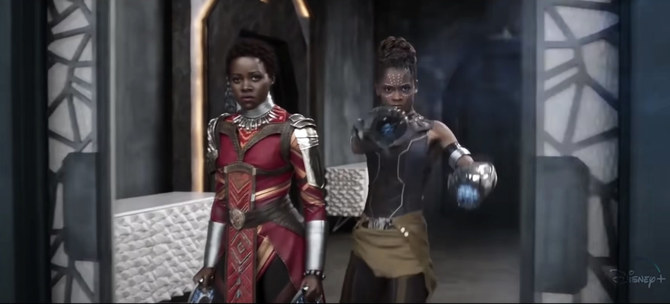How Afrofuturism can inspire a better post-pandemic world

https://arab.news/cxkx7
They may be works of fiction and art, but the “Black Panther” blockbuster and the “cosmic” compositions of jazz legend Sun Ra represent a genre that could offer inspiration for how we rebuild in a post-pandemic future.
Afrofuturism is an artistic movement that re-imagines worlds through the lens of black culture, including science, technology and the arts. While it most commonly appears in science fiction, the genre extends across literature, music and philosophy. It essentially paints more realistic images of a future from the perspective of a segment of Western society that has long been marginalized.
Nearly two years of global pandemic and the increasing ravages of climate change have led many to turn to art to glean some hope that things might get better — or to consider how they might get worse.
Afrofuturism has for decades offered visions of how to build fundamentally different worlds and societies. Now, more than ever, society needs new approaches and ideas for confronting global challenges, and Afrofuturism is proving to be a vital tool for thinking about near-future possibilities. Futurists ask how tomorrow’s hoverboards and flying cars will be made. Afrofuturists ask who will build them. Due to its focus on human struggle, Afrofuturism also provides critical perspectives on the last year of the pandemic.
The term “Afrofuturism” was coined nearly 30 years ago by a white author named Mark Dery in an essay called “Black to the Future.” In his writing, Dery looked at how some speculative fiction has been shaped by the African diaspora. This is the basis for Afrofuturism.
Dery asks: “Can a community whose past has been deliberately rubbed out, and whose energies have subsequently been consumed by the search for legible traces of its history, imagine possible futures? Furthermore, isn’t the unreal estate of the future already owned by the technocrats, futurologists, streamliners and set designers — white to a man — who have engineered our collective fantasies?”
The success of the “Black Panther” movie adaption of the Marvel comics brought Afrofuturist themes to a mainstream audience. The fictional African nation of Wakanda is depicted as the most technologically advanced in the world, with magnetic levitation public transport systems and virtual reality operated aircraft.
Now, more than ever, society needs new approaches and ideas for confronting global challenges, and Afrofuturism is proving to be a vital tool for thinking about near-future possibilities.
Joseph Dana
Modern music artists such as Beyonce and her sister, Solange, have led a resurgence of interest in jazz composer Sun Ra, whose music and performances imagined an intergalactic world combining science fiction and ancient Egypt.
While the development of Afrofuturism has occurred mainly in the US, the discipline has global appeal. It also need not focus solely on the African experience. Instead, it should be a jumping-off point for creating multiple new areas of speculative thinking and culture imbued with non-Western perspectives.
This could take on a Middle East or even Chinese connotation. Consider the popularity of Liu Cixin’s “The Three-Body Problem” series of science-fiction books. The decidedly Chinese works have garnered international appeal, with recommendations from Barack Obama and a Netflix adaptation in the works.
The “Parable of the Sower” series is a prime example of how Afrofuturism can help us grapple with seemingly insurmountable problems. The novels were published in the early 1990s by science-fiction writer Octavia Butler. They take place in a dystopian California ripped apart by climate change and social inequality. Those who have the means live behind highly fortified fences, while the rest of society is consumed by violence and drug abuse. Fundamentalist political leaders run campaigns with the promise to “make America great again” (that’s right, Butler coined the phrase).
Butler’s protagonist flees a burning Los Angeles to form a new community guided by a belief in science that will lead humanity to “take root among the stars.” The rise of Donald Trump and the outbreak of the pandemic meant Butler’s work has enjoyed a spike in popularity. Indeed, anyone reading her in 2020 must be disturbed by her futuristic visions of society ripped apart by climate change, political disunity and pandemic.
Afrofuturist approaches to core questions about who builds the technology of the future, how it will affect society and who will benefit are the most salient contributions of the genre. The dismal global rollout of COVID-19 vaccines is a stark reminder of the primacy of this approach.
In August, shocking details of Johnson & Johnson’s relationship with South Africa to manufacture coronavirus vaccines came to light. As many as 32 million doses of the vaccine, “filled and finished” in South Africa, were exported to the EU in recent months. Given the low vaccination rates across Africa, and South Africa in particular, this news is shocking.
The saga sounds like it was borrowed from a work of Afrofuturism. A wealthy Western company helps set up medical capabilities in a developing country not to aid the local population in need of vital medicines but to lessen the labor cost for products earmarked for Western markets. If we want to believe the adage that “another world is possible” in the wake of the pandemic, we need to lean heavily on the creativity of the Afrofuturist canon.
Developing countries continue to be battered by the pandemic because of scarce resources to fight the virus and general mismanagement of the crisis. The effects of climate change will compound matters in the near future. We need all the insight and forethought of the Afrofuturists that we can get to navigate the challenges ahead.
• Joseph Dana is the senior editor of Exponential View, a weekly newsletter about technology and its impact on society. He was formerly the editor in chief of emerge85, a lab exploring change in emerging markets and its global impact. He lives in Cape Town, South Africa. Copyright: Syndication Bureau









































